By Jane from Wake Up San Francisco
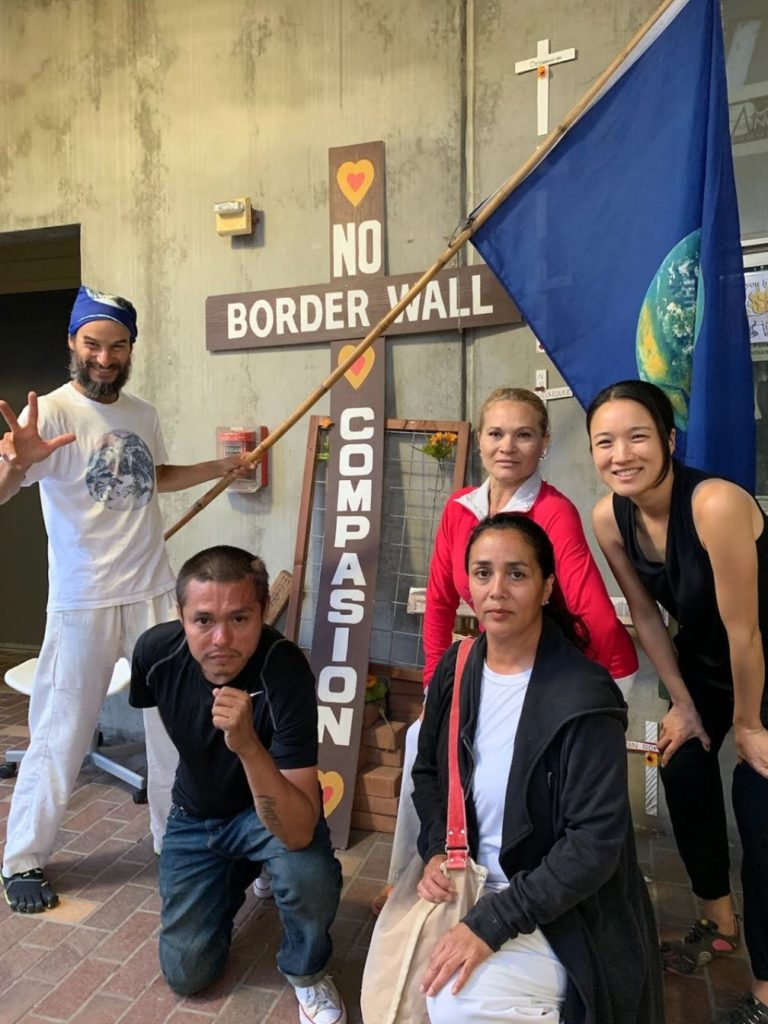
Walking through busy downtown San Diego’s Gaslamp Quarter carrying a backpacker’s pack, wearing toe shoes, and toting a massive flag of the earth tied to a tall bamboo pole was simultaneously exhilarating and deeply uncomfortable. I’m not used to standing out in an urban crowd, and my fellow companions and I stuck out like Ed Sheeran standing next to Beyoncé.
I wouldn’t have had to courage to take to the streets like this were it not for my friend and nonviolent leader, Pancho Ramos Stierle, who had been walking from Oakland to San Diego for the past three months. Pancho and I met serendipitously during the first week of his pilgrimage while hiking in the Berkeley Hills. I asked what his enormous earth flag stood for and he replied, “I’m walking from the Bay Area down to the so-called border and crossing to Tijuana. I’m an undocumented immigrant who is unafraid and have been living in here in the Bay Area for the past 15 years. I’m walking to show that we are all one earth family and that no human is illegal.” It wasn’t so much what he said, but how he said it that snowballed into both of us tearing up, exchanging deep hugs and a promise on my end that I would join him on his walk someday. That day was today, the 91st day that Pancho has been walking, with only 4 more days left till he reaches the border. There is no guarantee that he will ever set foot back in this part of the world and he has far more to lose than I do with my ID nestled snugly in my wallet along with money and credit cards should I need it.
I’m an undocumented immigrant who is unafraid and have been living in here in the Bay Area for the past 15 years. I’m walking to show that we are all one earth family and that no human is illegal.”
Yet he is the one smiling non-stop from ear to ear and waving to everyone we pass by calling them “brother” or “sister” and wishing that they “make a beautiful day”. His uninhibited friendliness startles some people or peaks their curiosity. Some ask about the earth flag and Pancho repeats his mission, the same one he told me, looking squarely into the brother’s or sister’s eyes with rapt attention as if the person standing in front of him is the only person in existence.
As we inch our way towards the downtown Convention Center, conference participants spill out still wearing their badges atop their business attires. Pancho greets them with the same enthusiasm I’ve seen him greet people of all ages and even dogs with, and I follow suit, unable to resist the fun of being friendly. Most of them avert their gaze and when I do make eye contact, I sometimes see fear – perhaps from a misunderstanding that we’re trying to sell them a product, or even more dangerous, an ideology. They rush away without looking back, and I see a reflection of myself in their disappearing backs. If I had met Pancho during rush hour, would I have even given him with his scraggly beard and an unusual flag accompanied by an unusually big smile, a second glance? Probably not, and that makes me deeply sad about the opportunities our busyness, distrust, and fear blinds us to.
During our walk, Pancho had connected with a volunteer-run non-profit group in San Diego called Border Angels that serves migrants near the border, including organizing water drops where gallon containers of water are placed in the desert along high-traffic migrant paths. There was a water drop happening the very day we visited. Volunteers drove 2.5 hours from San Diego to the scorching Jacumba wilderness and hiked 6 miles to place water as close to the border as possible. Board member and Immigration attorney, Dulce Garcia, met us after returning from the desert caravan trip looking weathered by the heat. “It was 105 degrees today,” she explains, “We had some people from South Dakota who wanted to help and learn about migrants with us and they were struggling. It was a struggle for me too.”
“What’s been the hardest thing to see,” she explains, “is the dehumanization of our people.
Still she graciously sat down to talk to us, describing how Border Angels came into being when Operation Gatekeeper was launched by the US government in 1994, resulting in an estimated death of 11,000 women, men, and children trying to cross the border with the main cause of death being dehydration. Dulce herself is an undocumented immigrant who volunteers her time at Border Angels not only participating in water drops but offering free legal assistance to immigrants. “What’s been the hardest thing to see,” she explains, “is the dehumanization of our people. Particularly with the current administration, we’ve seen unprecedented racism and inhumane acts. Until recently, there used to be a ‘Door of Hope’ where family on opposite sides of the border can see each other for 3 minutes. They could hug family members that they otherwise would never get a chance to touch. But the Border Patrol recently shut that down, and people won’t get a chance to see their mothers, fathers, grandparents, and children in person again.”
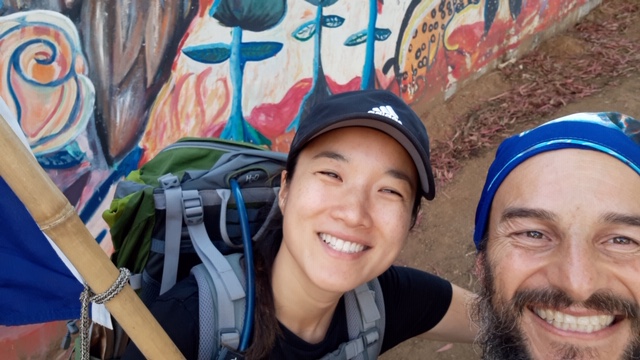
This news shocks me out of my ignorance. Immigration is multi-faceted issue and I don’t claim to have any simple solution. However, closing the “Door of Hope” is not an issue around our immigration policy but our humanity. If this is news to Pancho, he doesn’t show it, as he says with a firmness, “This, sister, is exactly why when they build walls, we need to build bridges.” Pancho then described his dream of one day having a global act of civil disobedience where citizens of the world all go to their so-called borders and bury their passports. He acknowledges that this is a far-fetched dream but his eyes blaze with a conviction that says otherwise.
On his 95th day of walking, Pancho walked the last 3 miles with people carrying figures and banners of migratory species, evoking the sacred nature of migration. The culmination of the walk was going to happen at the First Assembly of the Peoples, Neighborhoods and Communities of the San Diego – Tijuana Region, at the Tijuana Cultural Center. As he was crossing the so called “border”, he climbed up atop the metal turnstile and tied a miniature Earth amidst the barbed wire.
He and his companions passed the first revolving door and then they had to choose between two lines: Mexicans and Foreigners, to which Pancho said, “We need a third line–one for citizens of the World.”
Without any documents to prove that Pancho grew up in Mexico City, and regardless being Spanish native speaker, the Mexican authorities detained him and turned him to the Customs Border Protection (CBP), becoming the first Mexican deported by Mexican authorities to the part of the planet we call the U.S.
Interrogated multiple times by both governments–they didn’t know what to do with him; this was a common dynamic:
“Where were you born?”
“Planet Earth.”
“What is your nationality?”
“I’m a citizen of the World.”
“How old are you?”
“~13.7 billion years old. Our cosmic age, we better act accordingly.”
“Do you have an ID?”
“No, just my humanity.”
“Do you have anything else to add?”
“Yes, I want you to know that I love you.”
If you haven’t met Pancho, you might mistake his tone as being facetious, but what makes him such a rebel is that he means what he says. He wants you to know that you are loved, not to inform you, but to remind you of your lineage, your unique, powerful, and essential role in this one earth family. In this family, the bonds that tie us together are not mere blood, race or ethnicity, but a love that has the power to unstitch our hearts and sew them back together so that one heart cannot be distinguished from another. The door of hope may be closed but a bridge of love is being constructed, one step, one heart, and one courageous action at a time.
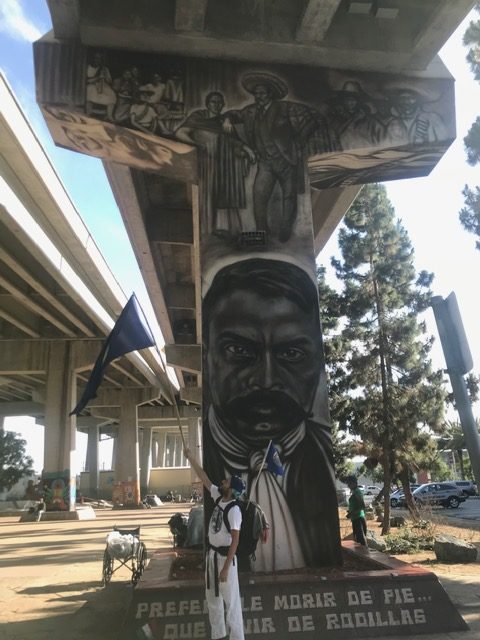
Reprinted with permission from https://wakeupsf.org/how-to-blog/f/how-to-cross-the-border

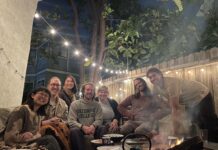








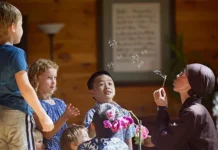






Amazing offering, thank you for offering and posting here. Just hearing about this has restored some form of a door of hope that we can all learn to open in our own ways.
[…] and I, along with our friends Jane and Angela, recently had the opportunity to join brother Pancho in Tijuana at a shelter serving a […]